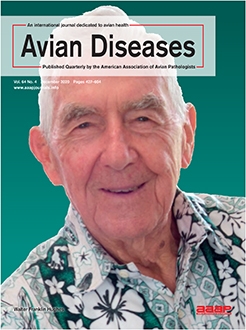The prevalence of Gallibacterium anatis in poultry production has increased over the last two decades. However, only a few studies have explored the pathogenicity of this bacterium in commercial layer chickens. This trial studied the aspects of the pathogenicity of a Gallibacterium anatis biovar haemolytica local Egyptian isolate (previously registered as strain B14 with GenBank accession no. KJ026147). We used 500 base pairs of a 16S ribosomal RNA gene and the 16S-23S ribosomal RNA intergenic spacer, partial sequence in an experimental infection trial in commercial White Shaver layer chickens aged 19 wk. The hens were divided into three groups of 40 birds each. The hens in Groups 1 and 2 were experimentally infected through the intranasal (IN) and intravenous (IV) routes, respectively, with a dose of 0.2 ml/bird containing 1.2 × 109 colony-forming units/ml. In contrast, Group 3 was kept as a noninfected control group. Both IN and IV infections resulted in a delayed egg laying for 1 wk and a significant (P ≤ 0.05) drop in egg production by 7.81% and 10.28% compared with the control group over 7 wk. Severe lesions in the form of hemorrhagic pneumonia, catarrhal tracheitis, ovarian follicle and oviductal regression, and septicemia were evident on necropsy, demonstrating the pathogenicity of G. anatis as a primary pathogen.
How to translate text using browser tools
20 July 2020
Respiratory and Reproductive Impairment of Commercial Layer Chickens After Experimental Infection with Gallibacterium anatis Biovar haemolytica
Ahmed R. Elbestawy,
Hoda A. Abd-Ellatieff,
Hany F. Ellakany,
Hatem S. Abd El-Hamid,
Abdelrahman A. Abou Rawash,
Ahmed R. Gado,
Ayman H. Abd El-Aziz,
Amal A. M. Eid,
Nahed A. El-Shall
ACCESS THE FULL ARTICLE

Avian Diseases
Vol. 64 • No. 4
December 2020
Vol. 64 • No. 4
December 2020
chickens
Gallibacterium anatis biovar haemolytica
pathogenicity
reproductive
respiratory




